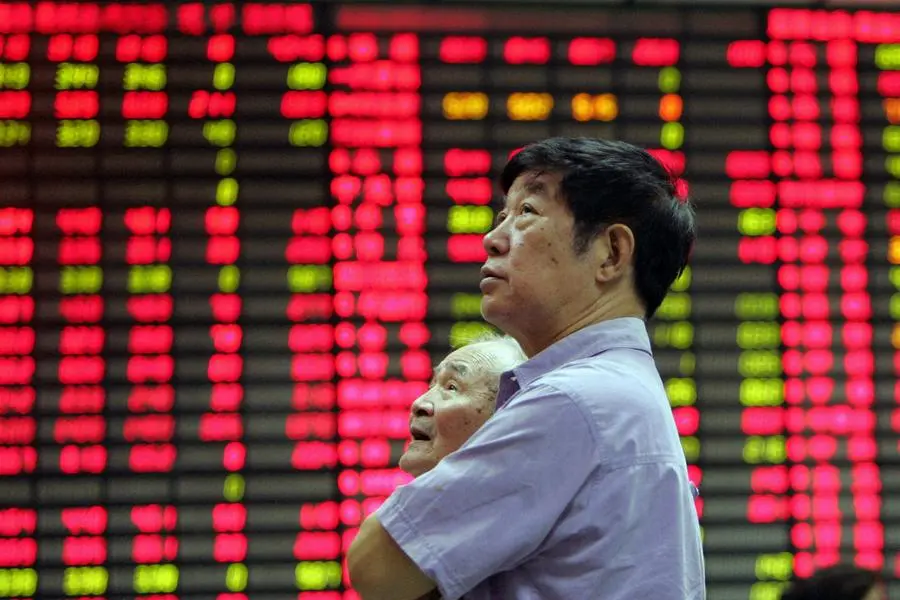PHOTO
Global shares eased below their recent highs on Tuesday, as the start of China's week-long annual session of parliament lacked any big-ticket stimulus plans, leaving investors disappointed, while bitcoin remained tantalisingly close to record peaks.
Equity markets took a knock from a retreat from record highs on Wall Street on Monday, as the U.S. Federal Reserve showed no signs of being in a rush to cut interest rates. U.S. stock futures also pointed lower.
Meanwhile, bitcoin hit a two-year peak of $68,828, just a whisker from a new record, while gold hovered around $2,100 an ounce, near an all-time high of its own.
The Chinese government retained last year's target for economic growth of "around 5%" for this year, and announced plans to run a budget deficit of 3% of economic output, down from a revised 3.8% last year.
It also unveiled plans to issue 1 trillion yuan ($139 billion) in special ultra-long term treasury bonds, which are not included in the budget.
Mainland Chinese stocks reversed early losses with the blue-chip CSI 300 up 0.7%, amid signs of suspected state-backed buying of some exchange-traded funds.
In Europe, where many big components of the market have heavy exposure to the Chinese economy, the STOXX 600 fell 0.1%.
The early announcements from China's NPC suggest "large fiscal stimulus is off the table for now," said James Kniveton, senior corporate FX dealer at Convera.
"Stability is still the overriding factor in Chinese policy making, and the announcements so far seem to conform to that philosophy."
Hawkish comments from Atlanta Fed President Raphael Bostic on Monday that there was no urgency to cut interest rates given inflation is above 2%, served as a reminder that there may not be much respite for investors on the monetary policy front any time soon.
Those remarks frayed nerves ahead of Fed Chair Jerome Powell's semi-annual testimony to Congress later in the week, as well as a deluge of key data on prices and jobs, culminating with Friday's non-farm payrolls report.
Kathleen Brooks, research director at trading platform XTB, said a pull-back, particularly in those assets that have performed strongly in recent weeks, was not unusual.
"When we’re at these key psychological levels, these record highs, of course we’re going to see a slowdown of sorts. That is to be fully expected," she said.
"Bitcoin is doing its own thing, I see that moving higher. Everything else, I see taking a bit of a back step," she said.
The dollar index, which measures the U.S. currency against six major peers, edged up 0.1% to 103.91.
The euro eased 0.1% to $1.0848 ahead of the European Central Bank's policy meeting on Thursday, at which traders see no change in rates. Futures imply an 88% probability that cuts will start in June, roughly in line with the timing of the first U.S. cut.
Sterling dipped 0.1% to $1.2678 ahead of Wednesday's UK budget. Finance Minister Jeremy Hunt has been trying to dampen speculation about big pre-election tax cuts.
Against the yen, the dollar was steady at 150.43, following Monday's 0.27% climb. The currency pair tends to be extremely sensitive to moves in long-term U.S. bonds. Benchmark 10-year Treasury yields eased 3 basis points to 4.185%, around their lowest for two weeks.
Elsewhere, crude oil ticked lower, as demand headwinds counterbalanced a widely expected extension of voluntary output cuts through mid-year by the OPEC+ producer group.
Brent futures were off 0.2% at $82.60 a barrel, while U.S. futures eased 0.4% to $78.41 a barrel.
($1 = 7.1975 yuan)
(Additional reporting by Kevin Buckland in Tokyo; Editing by Bernadette Baum and Chizu Nomiyama)




















